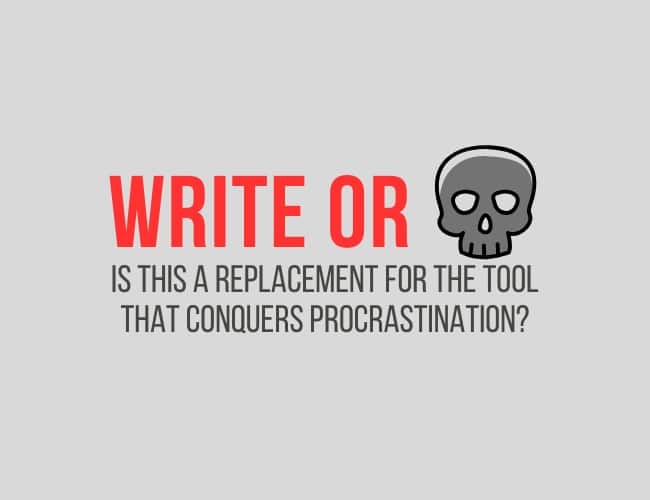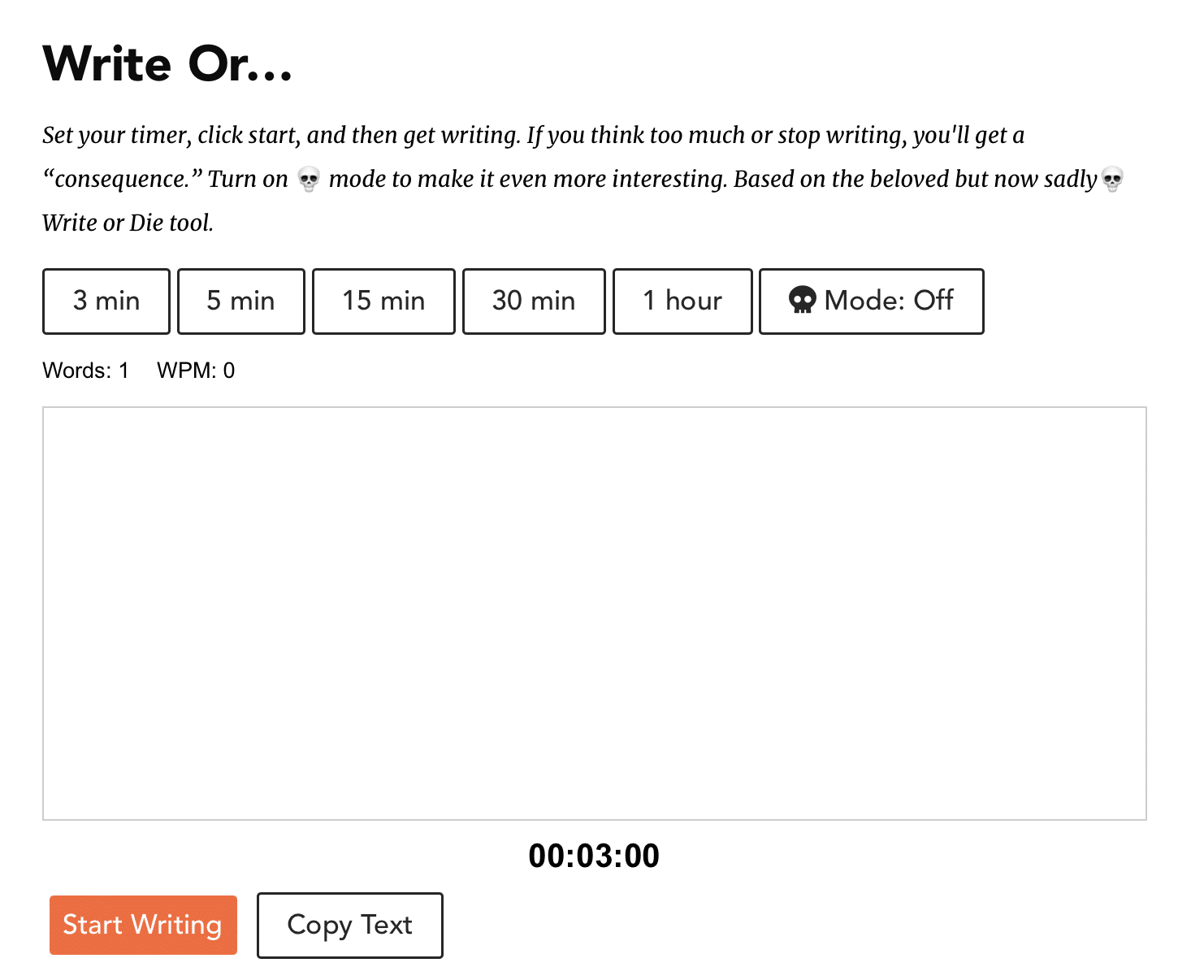Do you love writing but find it hard to be productive when working on your book? Many writers have used the Write or Die App in the past, but since it died itself, there hasn't been anything to take its place. Until now! Check out our cool new replacement for Write or Die, along with several tips for beating procrastination.

Write or Die was a writing app that used various tools to keep you focused and productive during timed writing sessions.
Not everyone loves restrictions when working on a book, but those who do often find the accountability factor a game changer to actually reaching their word count.
If this is you, but you haven't found the perfect tool to help with your procrastination pitfalls, our replacement for Write or Die might be the answer.
How an App like Write or Die Made My Writing Time More Productive
I’ll be the first to confess that I have problems with procrastination.
It’s much easier to dream and think about all the amazing, brilliant things you want to write than actually writing them.
These days, with the majority of writing done on a computer screen, there’s so much distraction readily at hand. Even as I type up this article, I feel the need to check social media, read a blog, or re-watch that one video I found of a clip from a Japanese stage musical. The one with delinquent teenagers with a really cool pop-and-lock routine.
The fact that I’ve already done all those things less than an hour ago doesn’t matter. Distraction reigns supreme.
Giving into distraction is easy because there are no consequences. Most of us are not full-time paid writers, and getting words written comes down to our ability to discipline ourselves.
No one’s going to scold us for watching a video every fifty words, or losing interest and putting our stories off until tomorrow because we’re “just not feeling it today.” Without consequences, we have no pressure to write, no matter how well-meaning our intentions.
This is where the Write or Die app used to help. It was basically an app to keep track of writing sprints. (Our full explanation of writing sprints here). It let you set goals and if you didn't type fast enough, or if you paused too long, it would send you a message (although after three times it was the scream of a runaway freight train) or the nuclear option: erase what you'd written.
Some might think that's too extreme, but if you're in a slump, gamifying your motivation might help. And while Write or Die has (ahem) died, and is no longer offered as an app, The Write Practice recently set up a replacement that works in much the same way.
A New Tool: The Write or Else
Joe here! We realized a while back that Write or Die had closed down, and we wanted to fill that gap with something simple and free. We created the Write or Else tool. If you want to try it out, you can click here to go directly to the timer. It's free! Let me explain a little about how it works.

The first thing to do is decide how long you want to sprint. You can choose one of the presets: 3 min, 5 min, 15 min, 30 min, or an hour. Then you click on the “Start Writing” button to begin. Start with the 3 minute option and see what happens when you stop typing for too long.
If you turn on the skull mode, your writing will begin to disappear if you pause too long!
At the end of your session, you can click “Copy text” and put the words into your document or writing software. Now back to J.D. and all her best tips for using apps like Write or Else!
How I Make Apps like Write or Die Work for Me
Every day, when it comes time to write, I first set up my favorite “background noise.” For many people this may be soothing music, a particular playlist of songs, or some kind of white or brown noise.
For me, this is most likely a TLC reality show.
Once I get comfortable, I open the sprint app and set up a session.
After some experimenting, I’ve found that my best “sprint” is fifteen minutes long, with a goal of six hundred words, which is a number I can hit a little more often than not.
Being a visual person, I like having a live clock and word count in front of me. Though evading punishment is definitely a drive, I enjoy watching the clock tick down as the word count increases, and push myself to pick up speed when the latter falls behind the former.
Once the time is done, I copy and paste what I’ve written into my main document in Google Drive.
On an average day, I can net about 1–2K words over two or three sessions. On an extra good day, I can get five or six sessions in and write over 3K words. No matter how many times I hear it, that freight train screaming at me through headphones still never fails to snap me out of any distraction.
I’ve tried a lot of motivation apps for writing over the years, and nothing has consistently kept me on track like Write or Die.
Sometimes all it takes to reach your writing goals is something that holds you accountable, that pulls you back to the page, like this app can do.
Why a tool like Write or Die May Not Be the Tool for You
While I’m a big fan of the tool, I have to be honest that it may not be for everyone. Here are a few reasons this app may not work for you:
1. Consequences don't work for everyone
The noise can be jarring for a lot of people.
While it works as motivation for me, the principle that the app operates under may become a distraction itself to some people.
So, if you're the kind of writer who prefers to work in silence than with sound signals, you'll probably prefer a different form of writing accountability.
2. Pressure might stifle creativity
In an effort to avoid consequences, you may find yourself typing nonsense to avoid the unpleasantness that may occur.
These days, I usually follow a fairly detailed book plan, so even under pressure, I know what part and scene I need to be working on. But if you’re a pantser, you may find yourself panicked and uncreative as the clock ticks down.
Some people thrive on pressure, but if pressure makes you anxious instead of productive, allot yourself longer chunks of time. But make sure you are disciplined when working in this time frame (I recommend turning off your internet).
3. Associating writing with punishment can be unpleasant
The fact is, writing is supposed to be a pleasant experience. Why write if it doesn’t make you happy?
If you start to associate your writing with unpleasant stimuli and begin to dread it, then the whole purpose of the app is defeated.
Here's what I recommend: Give the tool a try. If you walk away from the session feeling exhilarated and proud of your productivity, do it again the following day! If you walk away feeling disappointed in yourself, look for alternative forms of accountability to overcome your procrastination.
Tools Like the Write or Die App Can Keep You Motivated (and Productive)
Our replacement for the Write or Die app is a unique approach to keeping writers focused and motivated during their writing sessions. With sensory tools like sound signals and visuals like clocks that tick down the time set for your writing session, you could be inspired to write with concentration.
Writing the first or even second draft of your book doesn't need to be a perfect manuscript. If anything, worrying about trying to make each writing session and the work completed during it perfect will probably damage your productivity and confidence more than anything.
Giving productivity sprints a chance won't hurt you in the long run. And if anything, you might discover that it's the perfect book to get you to write your story to the end.
And if it's not? There are other forms of accountability you can use to keep you focused while writing. If this is you, you might be interested in checking out some of these other posts on how to be a productive writer:
- 7 Steps to Become a More Productive Writer
- 5 Productivity Hacks for Creative Writers
- The Ideal Schedule to Become a More Productive Writer
- Five Tips to Get the Most Out of Your Writing Sessions
- 3 Bad Writing Habits Preventing You From Writing (And How to Break Them)
But for me, I absolutely adored Write or Die while it was still working.
It’s gotten me through numerous bouts of writer’s block and kept me on track when deadlines approached. Even if you have doubts about whether it would work for you, I highly recommend at least giving it a shot.
It just might be the thing that finally beats your procrastination demon.
Have you tried Write or Die and liked it? Or do you have another writing app you prefer? Let us know in the comments.
PRACTICE
Give our new tool a try! Click here and set your timer for fifteen minutes. (If you prefer a timer without consequences, go here.) If you need a prompt for a practice writing session, consider one of these ideas:
- Crime Scene: A detective shows up to investigate the scene of a dead man but no murder weapon.
- Love Scene: A new girl comes to school and steals the attention (and heart) of the most popular girl in school.
- Coming of Age: A small town teenage boy catches his dad with another woman when he skips basketball practice.
Write fast so your words don't get deleted! When you're done, post your writing practice in the Pro Practice Workshop here, and don't forget to leave feedback for your fellow writers.



0 Comments